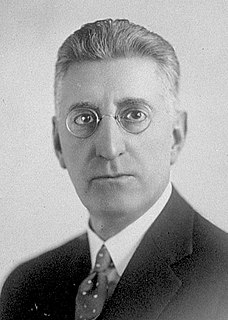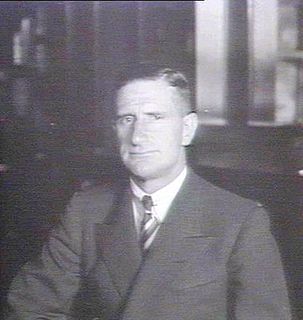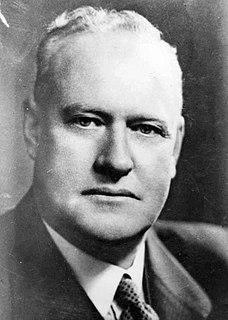Related Research Articles

The Electoral district of Wakehurst is an electoral district of the Legislative Assembly in the Australian state of New South Wales. It covers a significant part of Sydney's Northern Beaches as well as parts of the Forest District. Created in 1962, it has been won by the Liberal Party at all but two elections over the last half-century.

Newcastle is an electoral district of the Legislative Assembly in the Australian state of New South Wales named after and including Newcastle. It is represented since the 2014 Newcastle by-election by Tim Crakanthorp of the Australian Labor Party.

Reginald Walter Darcy Weaver was an Australian conservative parliamentarian who served in the New South Wales Legislative Assembly for 28 years. Serving from 1917 in the backbenches, he entered the cabinet of Thomas Bavin in 1929 as Secretary for Mines and Minister for Forests until he returned to opposition in 1930. Following the success of the United Australia Party in the 1932 election, Weaver returned as the Secretary for Public Works and Minister for Health in the Stevens ministry.

Arthur Edward Greenup was a trade unionist and politician in New South Wales, Australia.
Members of the New South Wales Legislative Assembly who served in the 38th parliament held their seats from 1956 to 1959. They were elected at the 1956 state election, and at by-elections. The Speaker was Bill Lamb.</ref>
×
Members of the New South Wales Legislative Assembly who served in the 34th parliament held their seats from 1944 to 1947. They were elected at the 1944 state election, and at by-elections. The opposition Democratic Party merged into the nascent Liberal Party in late 1944, becoming the New South Wales branch of the new party. The Speaker was Daniel Clyne.</ref>

Sir Vernon Haddon Treatt was an Australian lawyer, soldier, Rhodes Scholar and politician. Born in Singleton, New South Wales and educated at Shore School, Treatt interrupted his studies at the University of Sydney to enlist at the outbreak of the First World War. Serving in the Royal Australian Artillery, Treatt served in France and was awarded the Military Medal. Upon returning to Australia he was awarded a Rhodes scholarship and further educated at New College, Oxford.

Joshua George Arthur was an Australian schoolteacher and politician who represented the Hamilton and Kahibah districts for the Labor Party.
James Arthur Clough was an Australian politician. He was the Liberal member for Parramatta in the New South Wales Legislative Assembly from 1956 to 1959, and for Eastwood from 1965 to 1988.

Alfred Edden was a politician, trade union organiser and coal miner in New South Wales, Australia. He was a member of the New South Wales Legislative Assembly for more than 28 years, including 3 as Secretary for Mines. He was a foundation member of the Labor Party but left the party twice, in 1891 over the question of the solidarity pledge and was expelled in 1916 over the question of conscription.
Thomas Armstrong was an Australian politician. He was a member of the New South Wales Parliament from 1953 until his death in 1957. He was independent but generally supported the Labor Party government of Joseph Cahill. Armstrong was born and educated to elementary level in Lambton, New South Wales. He was the son of a coal-miner and began working as a miner at Wallsend Colliery at age 14. He eventually became an ironworker at the Newcastle Steel Works and became an official of the Federated Ironworkers' Association. He was elected as an alderman of Newcastle City Council between 1941 and 1953 and was the Mayor of Newcastle in 1952.

The 1950 New South Wales state election was held on 17 June 1950. It was conducted in single member constituencies with compulsory preferential voting and was held on boundaries created at a 1949 redistribution. The election was for all of the 94 seats in the Legislative Assembly, which was an increase of 4 seats since the previous election.

The 1953 New South Wales state election was held on 14 February 1953. It was conducted in single member constituencies with compulsory preferential voting and was held on boundaries created at a 1952 redistribution. The election was for all of the 94 seats in the Legislative Assembly.

The 1956 New South Wales state election was held on 3 March 1956. It was conducted in single member constituencies with compulsory preferential voting and was held on boundaries created at a 1952 redistribution. The election was for all of the 94 seats in the Legislative Assembly.

The 1959 New South Wales state election was held on 21 March 1959. It was conducted in single member constituencies with compulsory preferential voting and was held on boundaries created at a 1957 redistribution. The election was for all of the 94 seats in the Legislative Assembly.

The Cahill ministry (1952–1953) or First Cahill ministry was the 55th ministry of the New South Wales Government, and was led by the 29th Premier, Joe Cahill, of the Labor Party. The ministry was the first of four consecutive occasions when the Government was led by Cahill, as Premier.

The Cahill ministry (1953–1956) or Second Cahill ministry was the 56th ministry of the New South Wales Government, and was led by the 29th Premier, Joe Cahill, of the Labor Party. The ministry was the second of four consecutive occasions when the Government was led by Cahill as Premier.
Kahibah, an electoral district of the Legislative Assembly in the Australian state of New South Wales, has had three incarnations, the first from 1894 to 1920, the second from 1927 to 1930 and the third from 1950 to 1971.

The Royal Commission into Joshua Arthur or Doyle Royal Commission, formally called the "Royal Commission of Inquiry into matters relating to Joshua George Arthur and Reginald Aubrey Doyle" was a royal commission in New South Wales initiated by the Cahill government to investigate allegations against Joshua Arthur, the Secretary for Mines and Minister for Immigration.
References
- ↑ "Mr Joshua George Arthur (1906-1974)". Former Members of the Parliament of New South Wales . Retrieved 30 April 2019.
- 1 2 "Royal Commission of Inquiry into matters relating to Joshua George Arthur and Reginald Aubrey Doyle". NSW State Records and Archives. Retrieved 26 September 2019.
- 1 2 Green, Antony. "1953 Kahibah by-election". New South Wales Election Results 1856-2007. Parliament of New South Wales . Retrieved 24 September 2019.
- ↑ "M.L.A. swears charge on Doyle's car". The Canberra Times . 9 February 1953. p. 1. Retrieved 2 December 2021– via Trove.
- ↑ "Commission into Minister's link with Doyle". Illawarra Daily Mercury . 12 February 1953. p. 2. Retrieved 2 December 2021– via Trove.
- ↑ "Labor Party refuses Arthur's resignation, insists on expulsion". The Canberra Times . 22 August 1953. p. 1. Retrieved 2 December 2021– via Trove.
- ↑ Green, Antony. "1957 Kahibah by-election". New South Wales Election Results 1856-2007. Parliament of New South Wales . Retrieved 27 September 2020.